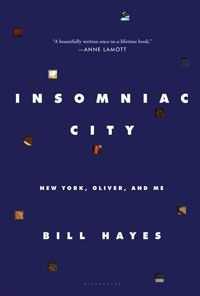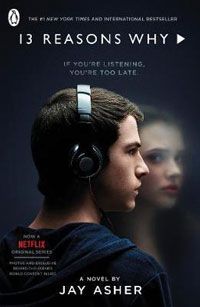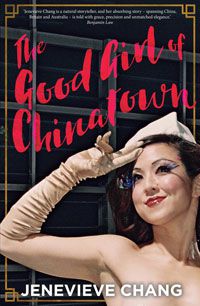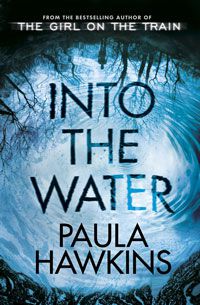Each week we bring you a sample of the books we’re reading, the films and TV shows we’re watching, and the music we’re listening to.
Amy Vuleta is reading Insomniac City by Bill Hayes
I’ve just started reading Insomniac City by Bill Hayes. This is a memoir of New York City, of insomnia and grief, of loss and love, and of the author’s relationship with the writer and neurologist, Oliver Sacks. I can already tell this is going to be a special book, the kind that fills you up and holds you tight. My eyes were welling with tears by page two, spilling over by page four. The book is packaged so beautifully – a glossy hardcover enfolded behind a matte dust jacket with small cut-outs revealing glimpses of the streetscape of the cover photograph. This will be a reading experience that I know I will savour.
Nina Kenwood is watching 13 Reasons Why
This past week, I’ve been consumed by two things. Firstly, the utterly brilliant and gut-wrenching new podcast S-Town. It made me cry and laugh and feel a lot of feelings about John B McLemore and the world in general. If you haven’t listened to it yet, I urge you to do so immediately.
I’ve also been avidly watching the new Netflix series, 13 Reasons Why, which is based on the popular YA novel of the same name (see the TV tie-in version here). I never read the novel because the conceit made me a little uncomfortable – the story is about a 17-year-old girl who commits suicide and leaves behind a series of tapes that call out the people she holds accountable for her decision to end her life. That description sounds like the cheapest form of emotional manipulation. But the show surprised me. Nothing about it is tacky, or easy, or romanticizing of suicide. In fact, I think it might be the most powerful depiction of teenage suicide I’ve ever seen.
The cast is talented and diverse, and the first half of the series feels like a solid teen drama, but the last five episodes are something else. 13 Reasons Why is very, very dark and it doesn’t turn away from the most complicated, sickening or difficult scenes. It’s not a perfect show by any means, but its treatment of assault, violence and the experience of being a teenage girl is quite extraordinary. I’m now planning to go back and read the novel.
Once you’ve watched the show (or read the book), I recommend listening to this podcast episode where two TV critics discuss it in-depth.
Leanne Hall is reading The Good Girl of Chinatown by Jenevieve Chang
I snapped up an early copy of The Good Girl of Chinatown (available 27 May) recently and read it avidly over one enjoyable weekend. It’s the memoir by Australian actor, writer and ‘reformed showgirl’ Jenevieve Chang, and it achieves the remarkable feat of traversing post-GFC Shanghai, 1980s Sydney and the Communist Revolution with ease. Chang’s time in Shanghai as a founding member of China’s first burlesque club, Chinatown, is interwoven with episodes of family history from London, China, Taiwan, USA and Australia. The troubled birth of Chinatown is a story in itself, with deception, chaos and mismanagement being the order of the day. The venture soon turns into an endurance event of hedonism, glamour, travel and performing. Where The Good Girl of Chinatown really sings though is in the unflinching and soul-baring look Chang takes at her own personal decisions in work and relationships, and how that intersects with the stories of her parents and grandparents. This is a smart and thoughtful look at intercultural relations, cultural identity and family.
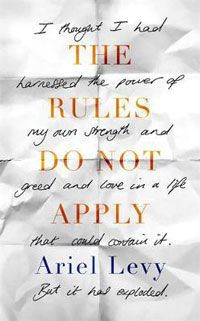
Jo Case is reading The Rules Do Not Apply by Ariel Levy
I’ve been a fan of Ariel Levy since her first book, Female Chauvinist Pigs, which questioned the real meaning of the then-ubiquitous rash of female ‘empowerment’ through performing sexuality: taking pole-dancing classes, wearing Playboy branded clothes, or embracing porn stars as aspirational glamour icons. (Do yourself a favour and check out Crazy Ex-Girlfriend’s spot-on satire of sexy-empowerment-feminism, ‘Put Yourself First’.) It was smart, addictive, voice-driven reading that felt as if it was coming from a ridiculously clever and articulate friend.
I’d been hanging out for her new memoir, The Rules Do Not Apply, since I first heard about it last year. And although it’s been criticised by some as another privileged white woman’s overblown problems, I think: a) that’s a silly, unexamined knee-jerk reaction; b) the story of a queer woman whose marriage dissolves after she miscarries her IVF baby (sperm donated by a gay friend) on assignment in Mongolia, then has an affair with an ex-girlfriend who has transitioned to being a man, while her wife struggles with alcoholism, is not exactly Eat, Pray Love territory.
My take? Levy is a brilliant writer (as anyone who’s read her New Yorker pieces will know). Like our own Helen Garner, her prose is deceptively simple and her approach coruscatingly, implicitly, knowingly self-critical. She draws herself as a character, Ariel Levy, whose specific experiences and internal contradictions provide a way into telling a story about the challenges of doing and having it all (career, motherhood, relationship, freedom), and the impossibilities of doing it all at once, even when you’re doing well. As someone who’s made my own discoveries about how much you can cram into one life, it really resonated.
Ellen Cregan is reading Into the Water by Paula Hawkins
I was lucky enough to get my hands on a copy of Paula Hawkins’s forthcoming new novel (available 2 May) and so far, it is proving very intriguing. It has sucked me in even faster than The Girl on the Train did, and Hawkins has woven in a touch of the supernatural that creates even more intrigue. One of the things i’m finding most enjoyable about this book is the way it’s been written and structured. The perspective shifts rapidly between members of the small community of Beckford. This narrative style can often have a a jarring effect but in this case – paired with Hawkins’ evocative prose – it works perfectly. Through these multiple narrators, Hawkins is able to drip feed us clues, gradually unravelling the mystery of Nel Abbott’s death.


